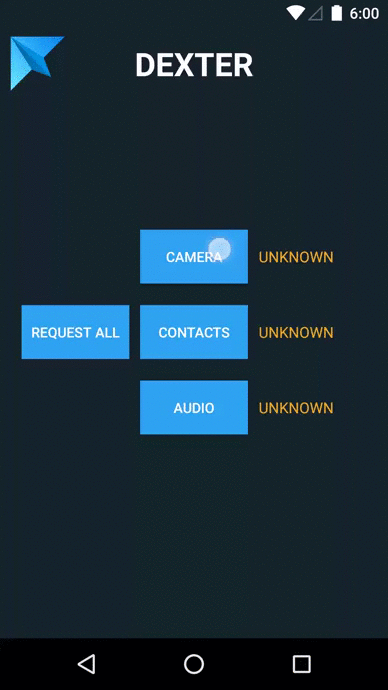Dexter is an Android library that simplifies the process of requesting permissions at runtime.
Android Marshmallow includes a new functionality to let users grant or deny permissions when running an app instead of granting them all when installing it. This approach gives the user more control over applications but requires developers to add lots of code to support it.
The official API is heavily coupled with the Activity class.
Dexter frees your permission code from your activities and lets you write that logic anywhere you want.
To start using the library you just need to initialize Dexter with a Context, preferably your Application as it won't be destroyed during your app lifetime:
public MyApplication extends Application {
@Override public void onCreate() {
super.onCreate();
Dexter.initialize(context);
}
}Once the library is initialized you can start checking permissions at will. You have two options, you can either check for a single permission or check for multiple permissions at once.
###Single permission
For each permission, register a PermissionListener implementation to receive the state of the request:
Dexter.checkPermission(new PermissionListener() {
@Override public void onPermissionGranted(PermissionGrantedResponse response) {/* ... */}
@Override public void onPermissionDenied(PermissionDeniedResponse response) {/* ... */}
@Override public void onPermissionRationaleShouldBeShown(PermissionRequest permission, PermissionToken token) {/* ... */}
}, Manifest.permission.CAMERA);To make your life easier we offer some PermissionListener implementations to perform recurrent actions:
EmptyPermissionListenerto make it easier to implement only the methods you want.DialogOnDeniedPermissionListenerto show a configurable dialog whenever the user rejects a permission request:
PermissionListener dialogPermissionListener =
DialogOnDeniedPermissionListener.Builder
.withContext(context)
.withTitle("Camera permission")
.withMessage("Camera permission is needed to take pictures of your cat")
.withButtonText(android.R.string.ok)
.withIcon(R.mipmap.my_icon)
.build();
Dexter.checkPermission(dialogPermissionListener, Manifest.permission.CAMERA);SnackbarOnDeniedPermissionListenerto show a snackbar message whenever the user rejects a permission request:
PermissionListener snackbarPermissionListener =
SnackbarOnDeniedPermissionListener.Builder
.with(rootView, "Camera access is needed to take pictures of your dog")
.withOpenSettingsButton("Settings")
.build();
Dexter.checkPermission(snackbarPermissionListener, Manifest.permission.CAMERA);CompositePermissionListenerto compound multiple listeners into one:
PermissionListener snackbarPermissionListener = /*...*/;
PermissionListener dialogPermissionListener = /*...*/;
Dexter.checkPermission(new CompositePermissionListener(snackbarPermissionListener, dialogPermissionListener, /*...*/), Manifest.permission.CAMERA);###Multiple permissions
If you want to request multiple permissions you just need to do the same but registering an implementation of MultiplePermissionsListener:
Collection<String> permissions = Arrays.asList(
Dexter.checkPermissions(new MultiplePermissionsListener() {
@Override public void onPermissionsChecked(MultiplePermissionsReport report) {/* ... */}
@Override public void onPermissionRationaleShouldBeShown(List<PermissionRequest> permissions, PermissionToken token) {/* ... */}
}, Manifest.permission.CAMERA, Manifest.permission.READ_CONTACTS, Manifest.permission.RECORD_AUDIO);The MultiplePermissionsReport contains all the details of the permission request like the list of denied/granted permissions or utility methods like areAllPermissionsGranted and isAnyPermissionPermanentlyDenied.
As with the single permission listener, there are also some useful implementations for recurring patterns:
EmptyMultiplePermissionsListenerto make it easier to implement only the methods you want.DialogOnAnyDeniedMultiplePermissionsListenerto show a configurable dialog whenever the user rejects at least one permission:
MultiplePermissionsListener dialogMultiplePermissionsListener =
DialogOnAnyDeniedMultiplePermissionsListener.Builder
.withContext(context)
.withTitle("Camera & audio permission")
.withMessage("Both camera and audio permission are needed to take pictures of your cat")
.withButtonText(android.R.string.ok)
.withIcon(R.mipmap.my_icon)
.build();
Dexter.checkPermissions(dialogMultiplePermissionsListener, Manifest.permission.CAMERA, Manifest.permission.READ_CONTACTS, Manifest.permission.RECORD_AUDIO);SnackbarOnAnyDeniedMultiplePermissionsListenerto show a snackbar message whenever the user rejects any of the requested permissions:
MultiplePermissionsListener snackbarMultiplePermissionsListener =
SnackbarOnAnyDeniedMultiplePermissionsListener.Builder
.with(rootView, "Camera and audio access is needed to take pictures of your dog")
.withOpenSettingsButton("Settings")
.build();
Dexter.checkPermissions(snackbarMultiplePermissionsListener, Manifest.permission.CAMERA, Manifest.permission.READ_CONTACTS, Manifest.permission.RECORD_AUDIO);CompositePermissionListenerto compound multiple listeners into one:
MultiplePermissionsListener snackbarMultiplePermissionsListener = /*...*/;
MultiplePermissionsListener dialogMultiplePermissionsListener = /*...*/;
Dexter.checkPermissions(new CompositePermissionListener(snackbarMultiplePermissionsListener, dialogMultiplePermissionsListener, /*...*/), Manifest.permission.CAMERA, Manifest.permission.RECORD_AUDIO);###Showing a rationale Android will notify you when you are requesting a permission that needs an additional explanation for its usage, either because it is considered dangerous, or because the user has already declined that permission once.
Dexter will call the method onPermissionRationaleShouldBeShown implemented in your listener with a PermissionToken. It's important to keep in mind that the request process will pause until the token is used, therefore, you won't be able to call Dexter again or request any other permissions if the token has not been used.
The most simple implementation of your onPermissionRationaleShouldBeShown method could be:
@Override public void onPermissionRationaleShouldBeShown(PermissionRequest permission, PermissionToken token) {
token.continuePermissionRequest();
}###Screen rotation
If your application has to support configuration changes based on screen rotation remember to add a call to Dexter in your Activity onCreate method as follows:
@Override protected void onCreate(Bundle savedInstanceState) {
super.onCreate(savedInstanceState);
setContentView(R.layout.sample_activity);
Dexter.continuePendingRequestsIfPossible(permissionsListener);
}IMPORTANT: Remember to follow the [Google design guidelines] 2 to make your application as user-friendly as possible.
Include the library in your build.gradle
dependencies{
compile 'com.karumi:dexter:2.1.1'
}or to your pom.xml if you are using Maven
<dependency>
<groupId>com.karumi</groupId>
<artifactId>dexter</artifactId>
<version>2.1.1</version>
<type>aar</type>
</dependency>
- Persmission that does not exists before API Level 16, should check the OS version and use ContextCompat.checkSelfPermission. See You Cannot Hold Non-Existent Permissions.
Feel free to add any useful feature to the library, we will be glad to improve it with your help.
Keep in mind that your PRs must be validated by Travis-CI. Please, run a local build with ./gradlew checkstyle build before submiting your code.
- [Butterknife] 3
Copyright 2015 Karumi
Licensed under the Apache License, Version 2.0 (the "License");
you may not use this file except in compliance with the License.
You may obtain a copy of the License at
http://www.apache.org/licenses/LICENSE-2.0
Unless required by applicable law or agreed to in writing, software
distributed under the License is distributed on an "AS IS" BASIS,
WITHOUT WARRANTIES OR CONDITIONS OF ANY KIND, either express or implied.
See the License for the specific language governing permissions and
limitations under the License.

